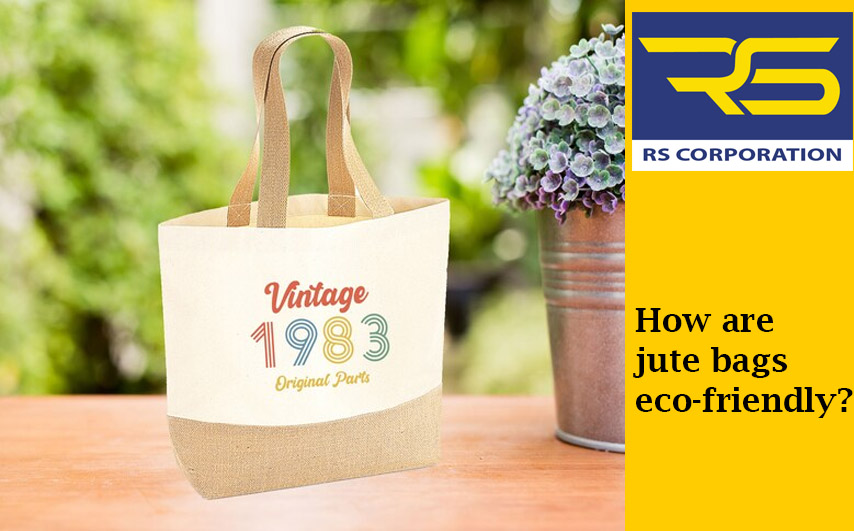Since people are becoming more aware of the environment, more and more attention is being drawn to sustainable options. In everyday items, the simple jute bag is one such eco-friendly star. You might be wondering, “How are jute bags eco-friendly?” The goal of this blog post is to reveal the environmental magic that is sewn into jute bags by looking at where they come from, how they are made, and the unique qualities that make them a symbol of sustainability. We’ll find out why jute bags are more than just a trendy accessory and how they’re becoming a strong part of the worldwide movement to stop using plastic bags and move towards a better, more sustainable future.
What is Jute?
Jute, a versatile and natural fiber, originates from the stems of the jute plant. Known for its strength and durability, jute has been a vital part of various cultures for centuries. The plant’s fibers are spun into coarse threads, forming the basis of jute fabric. Its biodegradable nature makes it an eco-friendly choice, as it naturally decomposes without leaving harmful residues. With origins in the Indian subcontinent, jute has played a crucial role in historical and cultural practices. Today, jute’s significance extends beyond its traditional uses, finding applications in diverse industries, particularly in the creation of sustainable products like jute bags.
Environmental Benefits of Jute Bags
Jute bags are great for the environment because they help make the world a better place in many ways. Their benefits to the earth are big and go beyond those of common alternatives like plastic. To begin, jute bags are biodegradable, which means they break down naturally without leaving behind any harmful materials. This helps the earth. Because jute is a renewable resource, it is grown in a way that doesn’t harm wildlife and doesn’t use too many synthetic materials. When compared to plastic bags, jute bags leave much less of an impact on the environment, helping to make the Earth cleaner and healthier. Few chemicals are used in the making of jute bags, which further reduces the damage to the environment. These bags are also long-lasting and can be used more than once, which promotes more environmentally friendly ways of shopping. Many people choose jute bags because they are good for the earth and fit in with the worldwide movement towards a more sustainable and planet-friendly way of life.
Jute Bags vs. Plastic Bags
When you choose between jute bags and plastic bags, you have a big effect on the earth. It turns out that jute bags are better for the environment than plastic bags, which are very bad for the environment. Biodegradable means that jute bags break down naturally and do not harm the earth as much as plastic bags do. Plastic is a major source of waste because it doesn’t break down naturally. This harms ecosystems for a long time. On the other hand, jute is a material that can be used over and over again and is grown in a way that uses fewer chemicals. Jute bags can be used more than once because they last a long time. This means that they don’t have to be made and thrown away as often as single-use plastic bags. Switching to jute bags is a real step towards a cleaner world that fits with the worldwide movement for eco-friendly options and a future without plastic.
Production Process
The method used to make cotton bags is simple and good for the environment. The process starts with collecting jute plants, which are a material that can be used over and over again. The jute fibers are separated and then made into strong threads after they are picked. Few chemicals are used in the stitching process, which is another way that jute bags are eco-friendly. After that, these threads are shaped into the shape of the bag that the customer wants. Because they are easy to make and made of durable jute, these bags are a great choice for people who want to leave less of an impact on the environment. By knowing the simple steps that go into making a jute bag, customers can enjoy the long-lasting qualities that make them a better choice for the environment than other materials.
Customization and Reusability
Not only are jute bags good for the environment, but they can also be customized and used again and again. Because they are strong, they can be used over and over again without breaking, which supports a healthy lifestyle. One thing that makes them unique is that you can add creative designs and names to jute bags, which makes them both useful and stylish. Because they can be customized, jute bags can be used for many things, from shopping to corporate events. Plus, the fact that they can be used again fits with the idea of lowering waste and being more eco-friendly. Customized jute bags are a cool way to make a statement and help make the world cleaner and more sustainable.
End-of-Life Considerations
When it comes to jute bags, their eco-friendly journey doesn’t end with use; it extends to thoughtful end-of-life considerations. Jute bags are inherently biodegradable, meaning they naturally decompose over time without leaving harmful residues. This end-of-life process ensures that jute bags have a minimal impact on the environment, unlike non-biodegradable materials such as plastic. Additionally, while jute bags can biodegrade, some recycling options may be available, contributing to a more circular and sustainable approach. By choosing jute bags, individuals actively participate in a lifecycle that prioritizes environmental well-being from production to disposal, making a positive choice for a greener planet.
Conclusion
In conclusion, jute bags are eco-friendly because they break down naturally, can be made from renewable materials, and have a small effect on the world. Jute bags are a great way to help make the future better because they are long-lasting alternatives to plastic bags. When you choose jute, you are consciously choosing to cut down on waste, support sustainability, and help make the world a cleaner, healthier place.



